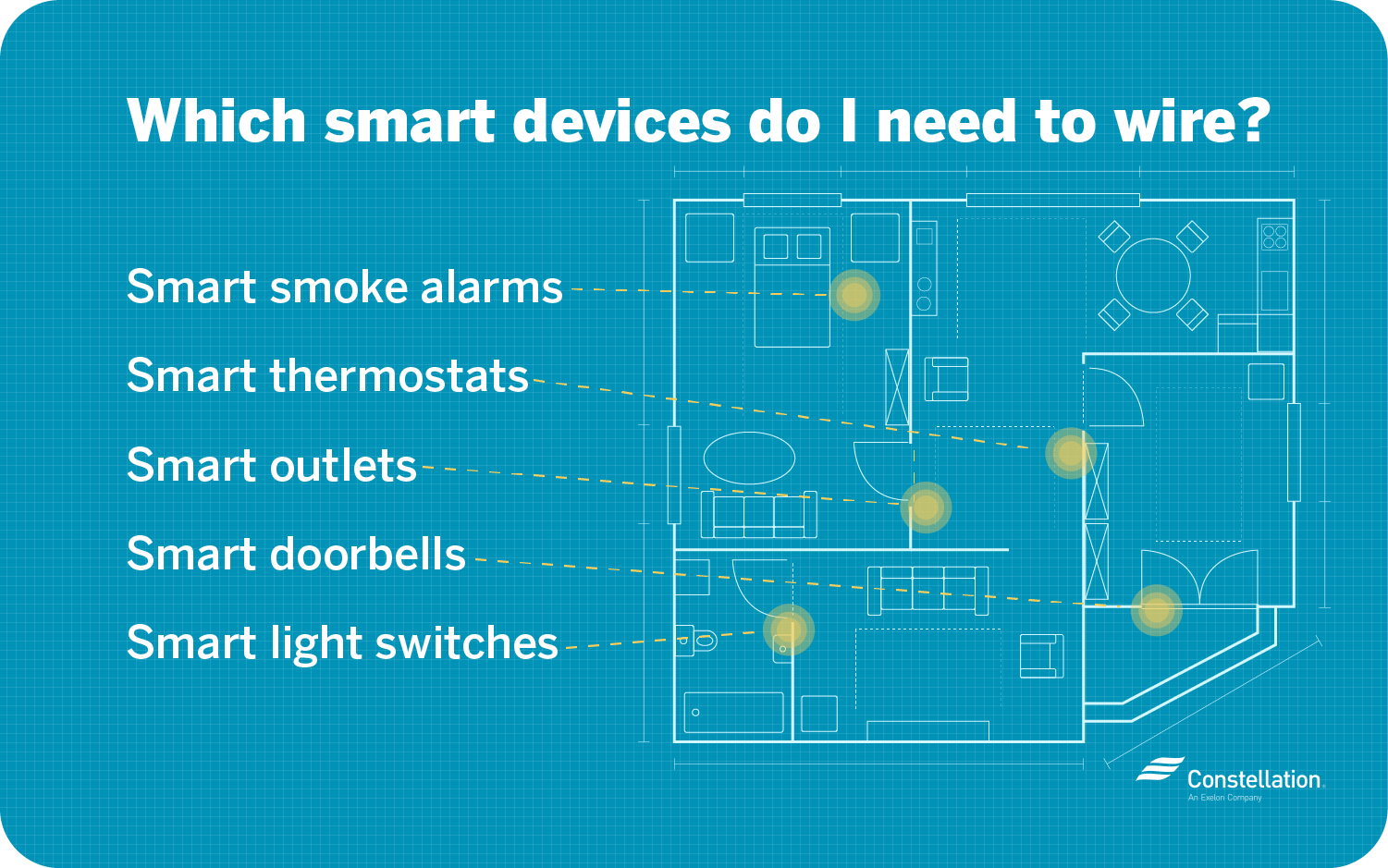
- Category:
Home Energy Savings - Published:
July 13, 2021
Your Guide to Smart Home Wiring
Smart home wiring might seem like something that goes without saying now that seemingly everything is becoming wireless. But here’s the problem: The more wireless devices you connect to your network, the weaker the signal each receives. That causes slow or even dropped connections.
At the same time, knots of wires from home electronics can still clutter your living space, with cables for routers, television boxes, computers and phone chargers tangling in an unmanageable mess. You get the worst of both worlds.
Smart wiring is a way to untangle the wires you need and better support wireless-only devices.
What is smart wiring?
Smart wiring is a series of panels that organize different types of wires and cables to provide reliable coverage for your dedicated home automation wiring and wires for your internet, PC, and audio, visual and gaming systems. It is something to consider as you set up your smart home.
You may have heard of structured wiring systems. Both structured wiring and smart wiring refer to a way to connect and integrate wires and cables for internet, television and audio entertainment, phone, home automation, home security and more, all in a way that provides speed, security, convenience and energy efficiency. Smart wiring supports today’s technology as well as smart home innovations that are coming in the future.
How much does it cost to smart-wire a house?
Prices will vary, but none can be considered low-cost for most people, often running into the thousands of dollars. Smart wiring for new homes is less expensive than retrofitting an older home because you won’t have to pay to open your existing walls.
Smart home wiring is an investment — one that’s best installed by professionals. The key costs are for the panels, the wires and the electrician’s labor. In many jurisdictions, you’ll also need to apply for permits and pay for inspections to make sure that your smart home wiring work is safe and up to code. Prices will vary dramatically depending on where you live, code requirements and the size of your home.
Here are some of the main expenses associated with setting up your smart wiring:
- Wiring
- Electrical panel
- Outlets
- Labor
- Opening walls (if retrofitting)
How to have your smart home wired
Now that you know what smart wiring is, the next question for interested homeowners is how to wire a smart home. For most people, the answer to the question is simple: Hire a professional. Working with electricity is dangerous if you don’t know what you’re doing. Making a mistake increases the risk of fire. And getting through permitting and inspections isn’t easy.
Which smart devices will need to be wired?
Although many smart home devices are wireless, others need a direct physical connection. Not all devices controlled by your smart home are smart themselves. Your air conditioner or refrigerator, for example, might be a “dumb” device with manual controls. With smart home wiring, you can connect these to smart controllers to include them in your smart system.
Below are some other commonly included components that work best if wired:

Smart thermostats
Your HVAC equipment doesn’t need to be smart as long as it connects to a smart thermostat. The thermostat can connect to your smart home hub wirelessly, but to control the power to your HVAC system, you need wires.
Smart light switches
Just like a smart thermostat, light switches control dumb equipment like lamps and light fixtures. Although smart light bulbs can be automated and controlled remotely, they typically only come in certain sizes and may not fit many fixtures in your home. The smart light switch can connect and control such lighting through wires, but it can connect to your smart hub wirelessly.
Smart outlets
A smart outlet turns any device into a smart device simply by plugging it in. Smart outlets control the flow of electricity to devices, so they need to be wired into your electricity even though they’re controlled wirelessly.
Smart smoke alarms
Because this piece of safety technology is so critical, it should have two power and communications connections, both wired and wireless, along with backup batteries.
Smart doorbells
Because security is one of the key reasons to have a smart doorbell, you don’t want to rely on batteries alone. Wiring it to your home electricity source and using backup batteries ensures that you stay safe and secure.
Should I do the wiring myself?
Electrical wiring requires real expertise. Mishandling electricity is dangerous in that it can create fire hazards. If you make a mistake, you’ll end up paying more to have a professional fix it than it would have cost to professionally wire from the start. In many jurisdictions, local codes require the use of a licensed electrician in order to get a permit and pass inspection.
Although some devices are easy to install yourself, putting in structured smart home wiring should be left to professionals. Once you’ve hired a pro to do the wiring, adding devices is a relatively small additional expense that’s often worth the cost in saved hassles.
Are smart wires worth it?
To truly enjoy the promise of your smart home and your smart home energy management system, it’s a good idea to invest in smart home wiring. The initial expense can be a hit to your budget, but the benefits can outweigh the costs — especially if you’re smart-wiring a new home under construction, when you can sidestep the extra cost of opening walls.
The benefits of installing smart wiring in your home
As you weigh your options as to how to wire a smart home, realize that whatever path you choose, you’re opening the door to considerable benefits:
- Enjoy home automation features. Robust and up-to-date home automation wiring ensures that you enjoy dependable high performance across your systems. With efficient operation, you can get the most from smart home energy-saving strategies.
- Boost your home’s value. Smart home wiring future-proofs your home for smart home upgrades so that you can benefit from innovations that are coming to market fast. You’ll increase the value of your home today and in the coming years.
- Put all your appliances and devices on a connectivity superhighway. The more devices you connect to your wireless infrastructure, the slower everything will run and the greater the chance you’ll have a connection failure. For a fast and dependable signal, hard-wire as many devices as is practical.
- Achieve high fidelity. It makes no sense to invest in an $8,000 television only to compress the signal to flow through a wireless connection. For high performance devices, smart wiring is best.
- Increase security. Closed wired systems are tougher to hack than a wireless signal. For devices you depend on for security, choose the wired option.
No longer is a wire just a wire. Your automated smart home and the best smart home devices will run better, more dependably and more securely if you invest in smart home wiring that accommodates all the key devices in your system. And you’ll stay ahead of the innovation curve for the future of smart homes.




